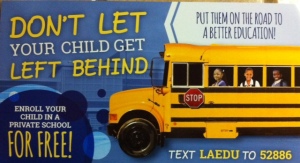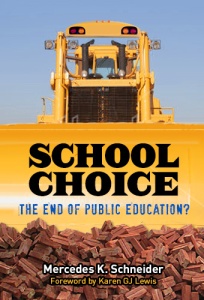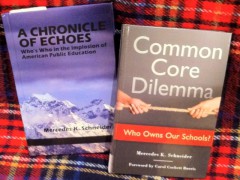DeVos and Alliance for School Choice: Where the Ultimate “Choice” Means Vouchers to Private Schools
For the past few years, I have been receiving mailers from Washington, DC-based, Alliance for School Choice (AFSC).
Alliance for School Choice is a nonprofit that promotes a particular kind of choice: publicly-funded vouchers to private schools.
The goal of these mailers is to get me to “enroll my child in a private school FOR FREE!”, thereby “put[ting]” my child “on the road to a better education!”
If I do not do so, I could be “letting” my child “get left behind.”
According to AFSC’s 2014 tax form (the most recent on file as of this writing), Michigan billionaire and voucher lover, Betsy DeVos, is AFSC chair.
Also noted on the AFSC tax form is that DeVos’ American Federation for Children (AFC) is the lobbying nonprofit associated with AFSC.
In fact, in a 2013 Philanthropy Roundtable interview, DeVos discusses her connection with AFSC and AFC:
The late John Walton and Dick started up what was then called All Children Matter, a 527 political organization, which I chaired. A number of other school-choice supporters also worked very closely with the Alliance for School Choice, a 501(c)(3), to educate the public about the need for greater educational choice. But it didn’t feel like a cohesive enough effort. Successful advocacy requires coordinating a lot of moving parts: identifying potential legislators, educating them about the issue, getting them elected, helping them craft and pass legislation, and then, once the laws are passed, helping them with implementing the programs to ensure they work for children.
We took a long, hard look at ourselves and determined that we could do this in a much smoother manner. It was clear that we needed a more cohesive effort. So a few years ago, we reorganized a number of the key players. We formed the American Federation for Children as a 501(c)(4). It is the umbrella organization that is affiliated with the Alliance for School Choice—still a (c)(3)—and AFC’s political action committee, the American Federation for Children Action Fund.
In 2014, AFSC’s total revenue was $9.2 million.
In 2014, AFSC spent $4 million trying to entice parents to use public money to send children to private schools:
CONDUCT MARKETING AND ADVERTISING PROGRAMS PROMOTING EDUCATIONAL CHOICE PROGRAMS BY TARGETING ELIGIBLE FAMILIES TO RAISE AWARENESS OF AND INCREASE PARTICIPATION IN EXISTING PRIVATE SCHOOL CHOICE PROGRAMS AVAILABLE TO THOSE FAMILIES IN THEIR RESPECTIVE STATES SERVE AS AN ADVOCATE FOR ELIGIBLE FAMILIES WITH THE GOVERNMENT ENTITIES ADMINISTERING PUBLICLY-FUNDED PRIVATE SCHOOL CHOICE PROGRAMS ON MATTERS RELATING TO ENROLLMENT PROCEDURES AND ACCOUNTABILITY MEASURES
AFSC spent an additional $3.5 million in “select states” in order to bolster voucher programs:
DIRECT GRANTS MADE TO NON-PROFIT ORGANIZATIONS, CONTRACTS WITH CONSULTANTS AND DIRECT EXPENSES INCURRED WITHIN SELECT STATES THROUGHOUT THE COUNTRY TO SUPPORT EFFORTS TO DEVELOP AND IMPLEMENT SCHOOL CHOICE PROGRAMS IMPLEMENTATION INCLUDES MARKETING AND ADVERTISING PROGRAMS PROMOTING EDUCATIONAL CHOICE PROGRAMS BY TARGETING ELIGIBLE FAMILIES TO RAISE AWARENESS OF AND INCREASE PARTICIPATION IN PROGRAMS AVAILABLE TO THOSE FAMILIES IN THEIR RESPECTIVE STATES SERVE AS AN ADVOCATE FOR ELIGIBLE FAMILIES WITH THE GOVERNMENT ENTITIES ADMINISTERING PUBLICLY-FUNDED PRIVATE SCHOOL CHOICE PROGRAMS ON MATTERS RELATING TO ENROLLMENT PROCEDURES AND ACCOUNTABILITY MEASURES
Finally, in 2014, AFSC spent $1 million “mobilizing” individuals “at the grass roots level” in order to promote “school choice”:
DEVELOP AND DISTRIBUTE RESEARCH AND POLICY MATERIAL TO EDUCATE POLICYMAKERS, STATE AND LOCAL LEADERS, MEDIA AND GENERAL PUBLIC ABOUT THE NEED FOR, AND SUCCESS OF, SCHOOL CHOICE, DEVELOP AND MOBILIZE AT THE GRASSROOTS LEVEL TO SHOW SUPPORT FOR SCHOOL CHOICE, CONDUCT PRINT, BROADCAST, DIGITAL, AND SOCIAL MEDIA ACTIVITIES TO PROMOTE SCHOOL CHOICE AROUND THE COUNTRY
“School choice” as in “vouchers to private schools” is not specifically mentioned in the $1 million AFSC expense; however, given that AFSC spent $7.5 million specifically for voucher promotion and $1 million on promoting school choice in general, it is logical to note that AFSC prefers “choice” in the form of vouchers to private schools.
Indeed, public money to private schools is the AFSC (i.e., DeVos) preference; such is obvious when one considers what is written on the other side of the AFSC mail-out.
To the left of the placard is a listing of Louisiana private schools that are willing to take voucher students. Above the listing is the following statement:
The Louisiana Scholarship Program allows children trapped in low-performing schools to receive a scholarship to attend a participating private school in the 2017-2018 school year for free.
Louisiana has 72 parish and city, traditional public school districts (in addition to the numerous charter schools that act as their own “local education agencies” as well as state-run districts in New Orleans and Baton Rouge/”other).
The AFSC voucher-promoting placard included private schools willing to accept vouchers; however, only 6 traditional school districts in Louisiana have private schools willing to accept voucher students.
And get this:
The largest list of voucher schools is in Orleans Parish, where only five out of 77 publicly-funded schools (6.5 percent) are (for now) traditional public schools.*
In other words, almost 94 percent of publicly-funded schools in the New Orleans area are charter schools.
According to AFSC, the New Orleans “low performing” schools in which students are “trapped” are the other choice that was supposed to fix New Orleans education– charter schools.
Charter school choice abounds in New Orleans, but the charter schools in New Orleans are mostly graded C, D, and F— the criteria for “failing” school.
So, AFSC is pushing New Orleans parents to escape almost-all-charter New Orleans in favor of private schools that will accept vouchers.
Betsy DeVos prefers using public money to send students to private schools.
One key issue is that private schools have to be willing to accept voucher students– it’s their choice, first and foremost. New Orleans has the largest number of willing private schools, and most of these are Catholic schools–which have been suffering from declining enrollment for decades.
Another key issue is that parents have to want the vouchers. According to the Louisiana Department of Education (LDOE), as of October 2016, 723,554 students were enrolled in Louisiana’s publicly-funded schools (traditional public and charter).
At the start of the 2016-17 school year, 7,807 students had signed up for and qualified for vouchers. Of these, 1,420 were verified as new to the program in 2016-17.
So, out of 723,554 Louisiana students enrolled in publicly-funded schools in 2016-17, only 1% (7,807 / 723,554) chose vouchers.
In her 2013 Philanthropy Roundtable interview, DeVos clearly expected more out of the Louisiana voucher program:
We’ve seen major advances recently in Louisiana and Indiana. Those two states passed programs that, between the two of them, have the potential to serve nearly one million students every year. Now, we know not all of those million eligible students are going to take advantage of the programs, but the chances for widespread adoption of educational choice are very high.
We were involved in both those states for several election cycles. Those reforms came about as the result, I believe, of an increasing focus on helping get the right people elected, helping to craft good legislation, helping to get it implemented once it’s passed, and then helping students find schools once the legislation is in place. At the American Federation for Children, we work at every stage of that continuum, which makes us unique among the national reform efforts. …
Back in 2008, in Louisiana, the state’s Department of Education was clearly opposed to implementing the new pilot voucher program that had been created by Gov. Jindal and a bipartisan coalition of legislators to help children trapped in failing schools in New Orleans. The department at that time seemed to put up as many roadblocks as possible. They gave parents one week—one week!—to sign up for the program. We had to work fast to come up with creative ways to alert parents of the new program.
We did everything we could to engage and inform parents about the voucher opportunity. We bought ad time on urban radio stations. We bought billboards and web ads, did mailings and phone calls. We worked with ambassadors from the various parish churches and community groups. We hosted parent-information meetings. It was all grassroots work. It can look like tedious work, but it’s massively important.
All of this grassroots activity also had the effect of raising awareness about the program among public officials and community leaders. When the legislature considered expanding the New Orleans program statewide in 2012, elected officials were aware of the tangible support for greater educational choice. From the beginning of the debate to the end, overwhelming parental satisfaction with the program was obvious. Today, with a far more supportive state Department of Education led by reform-minded Superintendent John White and a much longer enrollment period, the new statewide program in Louisiana enrolled nearly 5,000 children in its first academic year and is poised to grow again next year.
Even as this interview was published (spring 2013), the Louisiana Supreme Court ruled voucher funding unconstitutional because the money earmarked for public schools cannot be taken from public schools. Therefore, voucher program funding has to come from another source. Thus, a third key in voucher proliferation DeVos style is that the money used to fund the vouchers derive from the pool used to fund public schools, not some scraped-together budget line item.
If DeVos becomes US secretary of education, based on her established affinity for sending public money to private schools via vouchers coupled with Trump’s newfound love of vouchers, states will surely be lured into creating and expanding voucher programs– which could well mean state leaders’, uh, fixing those broken state constitutions to guarantee a ready public education fund stream into private school coffers.
As DeVos says in her 2013 interview, she “advocates for as much freedom as possible”–
–where “freedom” means taking public money from public schools and delivering it at private schools.
US Secretary of Private School Funding.
_________________________________________________________________
*Here we go: 77 total publicly-funded schools include 50 Recovery School District–New Orleans schools and 27 Orleans Parish School Board, OPSB, schools, accounting for overlap as schools transition back to OPSB from RSD, and accounting for McDonogh 35 Middle/High being a single school. Messy, I know.
_________________________________________________________________






Reblogged this on David R. Taylor-Thoughts on Education.
Reblogged this on Crazy Normal – the Classroom Exposé.
Taking all of that lucrative funding from public schools and delivering it handily to private schools: In our coming “great” America, whose children will be allowed on the bus, and whose children will be pushed under the bus? http://www.ciedieaech.wordpress.com/2015/09/24/on-the-bus-or-under-the-bus
This topic is about children not the salvation of government schools. We live in a competitive world and if schools are failing, which many are, they need competition that will strike fear in them, that if they want to continue to exist they must compete. So the real question is; why are you afraid of school choice? I have to wonder what you have to gain by disavowing school choice and coldly leaving the child behind.
This topic is about children not the salvation of government schools. We live in a competitive world and if schools are failing, which many are, they need competition that will strike fear in them, that if they want to continue to exist they must compete. So the real question is; why are you afraid of school choice? I have to wonder what you have to gain by disavowing school choice and coldly leaving the child behind. Also, why shouldn’t we give parents the autonomy of their own home?